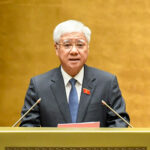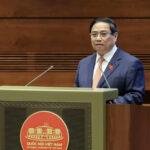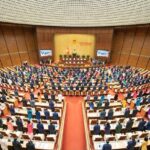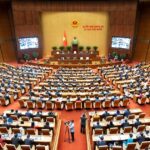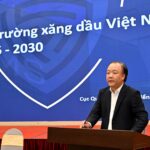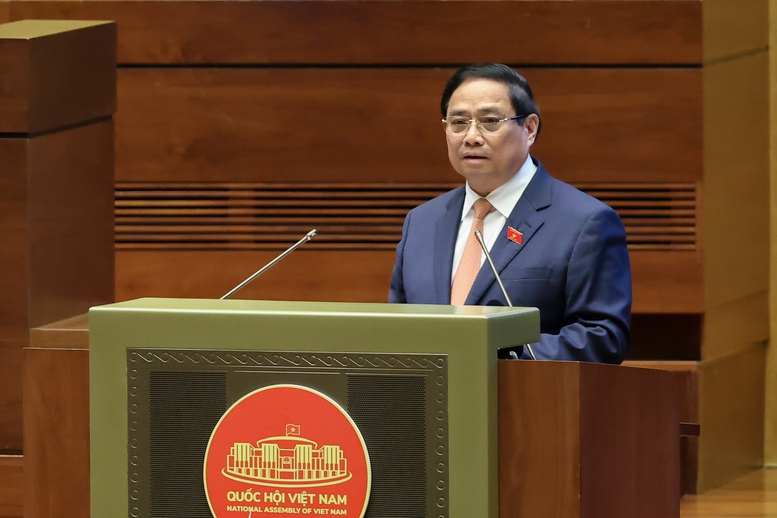
Prime Minister Pham Minh Chinh presented the Report at the opening session of the 10th National Assembly, XV term – Photo: VGP/Nhat Bac
On the morning of October 20th, at the opening session of the 10th National Assembly, XV term, Prime Minister Pham Minh Chinh delivered a concise report summarizing the outcomes of the Socio-Economic Development Plan for 2025 and the five-year period 2021-2025, along with the projected Socio-Economic Development Plan for 2026.
The Prime Minister highlighted that during the 2021-2025 period, amidst a complex and unpredictable global landscape with numerous unforeseen challenges, particularly the severe aftermath of the COVID-19 pandemic, Vietnam faced more domestic difficulties than opportunities. However, with unwavering determination, significant efforts, and decisive actions, the nation achieved and surpassed 22 out of 26 key socio-economic targets, nearly reaching 2 others. Notably, all social and welfare goals were exceeded, and in 2024 and 2025, all 15 socio-economic targets were met or surpassed.
The Government’s Report highlighted eight notable achievements.
First, Vietnam successfully controlled and effectively recovered from the COVID-19 pandemic, prioritizing “people’s health and lives above all,” earning international recognition and praise.
This involved shifting the pandemic response strategy to combine vaccination and administrative measures. Through robust diplomacy, Vietnam launched a nationwide free vaccination campaign, becoming a global leader in vaccine coverage (5th worldwide) with a mortality rate of 0.37%, significantly lower than the global average of 1%. The government also adapted strategies, safely reopening the economy, and provided substantial support: 119 trillion VND for 68.4 million workers and 1.4 million employers, along with tax breaks and deferrals totaling 580 trillion VND. Additionally, 23,300 tons of rice were distributed, and a Socio-Economic Recovery and Development Program was implemented, allocating over 265 trillion VND.
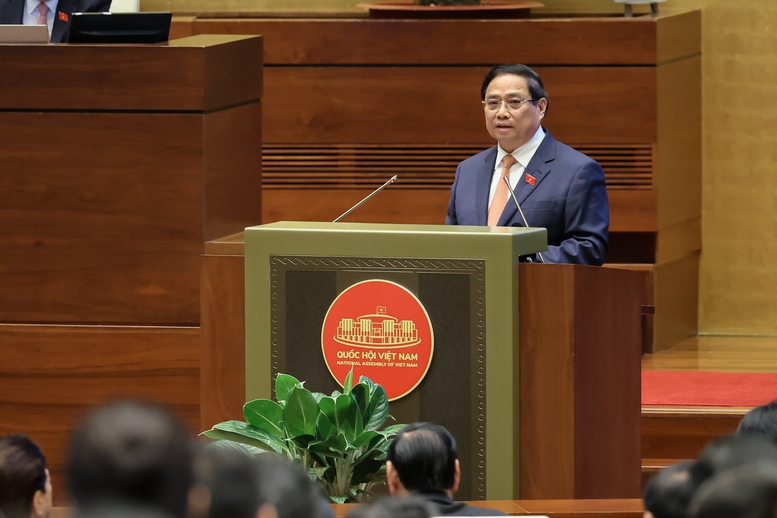
Prime Minister Pham Minh Chinh outlined eight key achievements – Photo: VGP/Nhat Bac
Second, Vietnam’s economy demonstrated resilience against external shocks, maintaining one of the world’s highest growth rates.
The 2025 GDP is projected to grow by over 8%, with an average of 6.3% for 2021-2025, surpassing the previous term (6.2%). Despite a 2.55% growth in 2021 due to COVID-19, the economy rebounded with an average 7.2% growth from 2022-2025, exceeding the 6.5-7% target. Vietnam’s GDP increased from $346 billion in 2020 to $510 billion in 2025, rising five positions to 32nd globally. Per capita GDP reached approximately $5,000 in 2025, 1.4 times higher than in 2020, entering the upper-middle-income group. Macroeconomic stability was maintained, with inflation controlled below 4% and balanced economic indicators.
State budget revenue reached 9.6 trillion VND, 1.36 times higher than the previous term, surpassing the 8.3 trillion VND target, despite 1.1 trillion VND in tax breaks. The forex market stabilized, and lending rates decreased by 2.5% compared to 2022. Public debt reduced from 44.3% of GDP in 2020 to 35-36% in 2025. The FTSE upgraded Vietnam’s stock market from Frontier to Secondary Emerging. With nearly 1 million active enterprises, a 20% increase since 2020, Vietnam attracted significant international acclaim, with organizations like the IMF and Standard Chartered highlighting its growth potential.
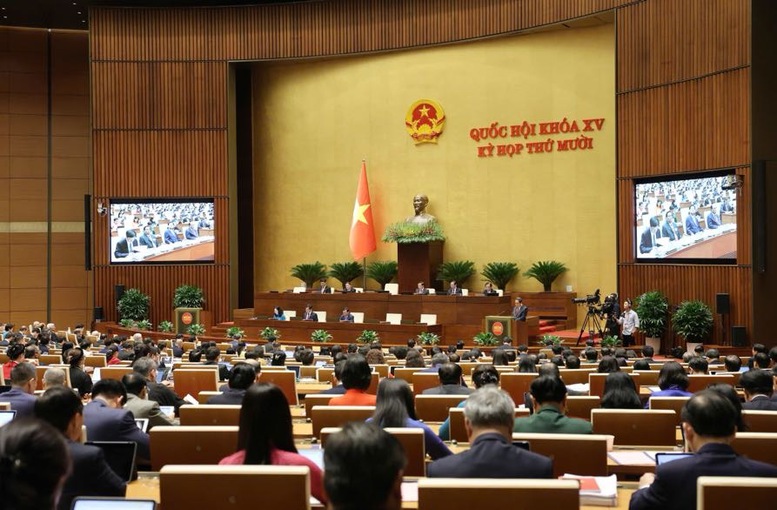
Opening session of the 10th National Assembly, XV term – Photo: VGP/Nhat Bac
Traditional growth drivers remained effective, with total social investment at 33.2% of GDP, meeting the 32-34% target. Public investment reached 3.4 trillion VND, a 55% increase (1.2 trillion VND more) compared to the previous term, focusing on quality over quantity. FDI totaled $185 billion, a 9% increase, placing Vietnam among the top 15 FDI recipients. Trade surged from $545.4 billion in 2020 to $900 billion in 2025, with a record $88.3 billion trade surplus, doubling the previous term. Tourism rebounded, with 22-23 million international visitors in 2025, the highest ever. Efforts to combat smuggling and intellectual property violations were intensified.
Third, three strategic breakthroughs were vigorously implemented, creating new development opportunities.
Legal reforms and policy implementation were innovated, addressing many bottlenecks. The Politburo issued several groundbreaking resolutions, and the National Assembly passed over 180 laws and resolutions, with 820 decrees issued, the most in any term. Administrative reforms simplified nearly 4,300 business regulations and citizen procedures.
Infrastructure saw significant upgrades, including 3,245 km of expressways (exceeding the 3,000 km target) and 1,711 km of coastal roads (surpassing the 1,700 km goal). Long Thanh International Airport’s Phase 1, a 4F-standard project, is nearing completion. Urban transport projects, seaports, and airports are operational. The Quang Binh – Hung Yen and Lao Cai – Vinh Yen 500 KV power lines were completed in record time. Social and cultural infrastructure received substantial investment, with the National Exhibition Center (VEC) ranked among the world’s top 10.
Labor structure improved, with agricultural workers decreasing from 28.3% in 2020 to 25% in 2025, and trained workers increasing from 64.5% to 70%. A plan to train 100,000 semiconductor and AI engineers by 2030 is underway. Labor productivity grew by 6.85% in 2025, exceeding the 6.5% target.
Fourth, science, technology, innovation, and digital transformation achieved significant initial results.
The National Innovation Center and National Data Center are operational. Vietnam ranked 44th out of 139 in the 2025 Global Innovation Index. Digital infrastructure expanded, with 100% broadband coverage in communes and top-20 global mobile internet speeds. E-commerce grew by 20% annually, and digital government initiatives saved approximately 3 trillion VND annually. Vietnam’s 2024 e-Government Development Index ranked 71st out of 193, a 15-position improvement since 2020. A project to cultivate 1 million hectares of high-quality, low-emission rice in the Mekong Delta is underway.
Fifth, long-standing projects were decisively addressed, unlocking development resources.
Five weak banks were restructured, with four commercial banks and the Development Bank now stable and efficient. Twelve loss-making projects and key energy projects (e.g., Song Hau 1, Long Phu 1, Thai Binh 2, Van Phong 1, Nghi Son Refinery, O Mon Power Plant, and Block B gas field) were resolved. Nearly 1,200 projects worth 675 trillion VND were revived. Efforts are ongoing to review and address nearly 3,000 projects with significant capital and land use.
Sixth, cultural and social sectors advanced, improving citizens’ lives.
The cultural and entertainment industries thrived, with 10 Vietnamese cultural heritages recognized by UNESCO. The Human Development Index (HDI) rose 18 places to 93rd out of 193. Healthcare access improved, with insurance coverage increasing from 90.2% in 2020 to 95.2% in 2025. Education quality enhanced, with many universities rising in global rankings. Vietnamese students won awards in all 194 international Olympiads they participated in. Tuition waivers and meal subsidies were introduced for disadvantaged students, and 248 modern boarding schools are being built in border areas, with 100 to be completed by 2026-2027.
Social welfare policies were comprehensive, with 1.1 trillion VND spent on social security (17% of the state budget), providing 700,000 tons of rice to the needy. Poverty rates decreased from 4.4% in 2021 to 1.3% in 2025. Monthly incomes rose from 5.5 million VND in 2020 to 8.3 million VND in 2025. Over 334,000 substandard houses were replaced, and 633,000 social housing units are under construction, with 100,000 targeted for 2025. The Social Policy Bank provided 517 trillion VND in loans to 10.6 million low-income households, including 22.1 trillion VND for social housing.
Disaster management, climate adaptation, and environmental protection were prioritized, with 47 trillion VND allocated for storm damage recovery. Vietnam’s Sustainable Development Index ranked 51st out of 165, a 37-place improvement since 2016. Celebrations marking 70 years of the Dien Bien Phu Victory, 50 years of Southern Liberation, and 80 years of National Day fostered patriotism and national pride. The Politburo allocated nearly 11 trillion VND for National Day gifts to all citizens. Vietnam’s 2025 World Happiness Index ranked 46th, up 37 places from 2020.
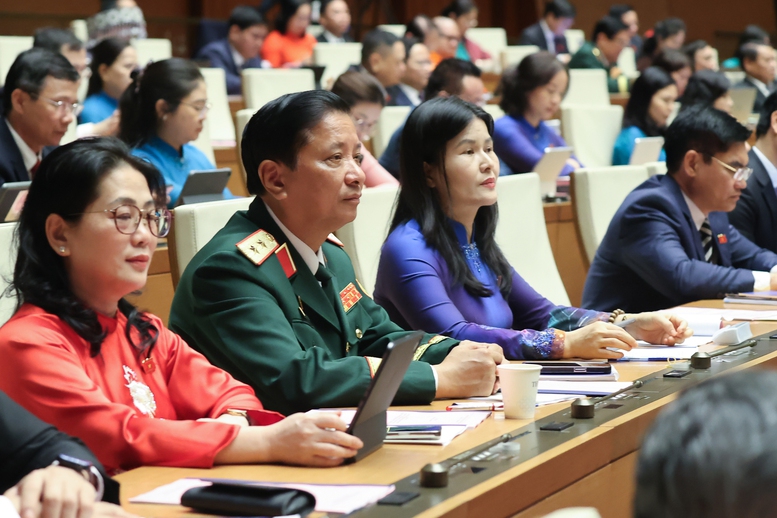
Delegates at the session – Photo: VGP/Nhat Bac
Seventh, government restructuring and local administration reforms were effectively implemented.
The administrative workforce was reduced by 145,000, saving 39 trillion VND annually. Local governments transitioned from administrative management to citizen-centric service and development facilitation. Anti-corruption efforts recovered nearly 425 trillion VND and 2,200 hectares of land. Over 13.6 trillion VND and $520,000 were retrieved from corruption cases, with assets worth 438 trillion VND seized.
Eighth, national defense and security were strengthened, ensuring sovereignty and public order.
Defense capabilities were enhanced, and international peacekeeping missions were successfully executed. Diplomatic achievements elevated Vietnam’s global standing, with strategic partnerships established with 38 countries, including all five UN Security Council permanent members and 17 G20 members. Vietnam was re-elected to the UN Human Rights Council for 2026-2028.
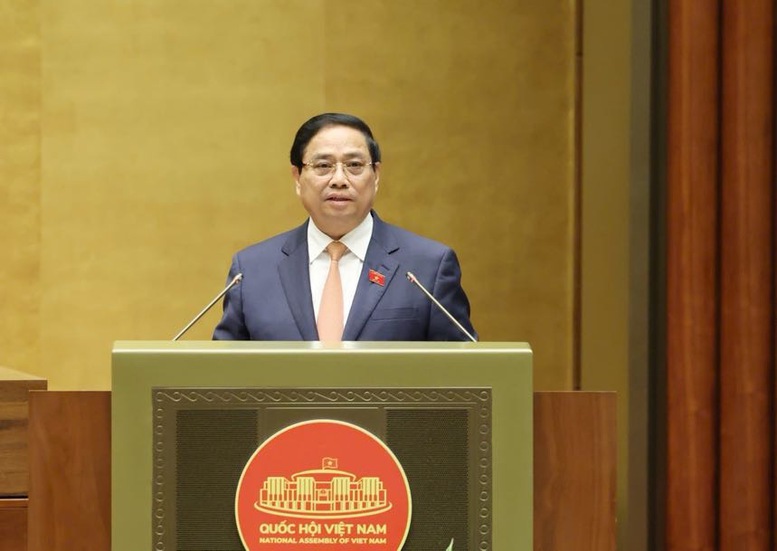
The Prime Minister emphasized that tasks and solutions until year-end include effectively implementing resolutions to achieve over 8% growth while maintaining macroeconomic stability – Photo: VGP/Nhat Bac
Despite these achievements, challenges remain, including macroeconomic stability pressures, policy gaps, complex market dynamics, and sectoral difficulties. Science and technology have yet to become primary growth drivers, and skilled labor shortages persist. Legal inconsistencies and administrative hurdles require further streamlining. Government restructuring and project resolutions need continued effort. Disparities in living standards, environmental issues, and security threats demand attention.
The Prime Minister attributed these successes to the Party Central Committee’s leadership, the National Assembly’s collaboration, the Government’s proactive policies, and the support of the people, businesses, and international community.
Key year-end priorities include implementing resolutions to achieve over 8% growth, ensuring macroeconomic stability, addressing project bottlenecks, completing public investment disbursement, and inaugurating major projects on December 19, 2025. Social welfare, disaster recovery, public order, and international integration will also be prioritized.
Early Job Position Identification, Staffing Quota Determination, and Implementation of the New Wage Policy
The Presidium of the Central Committee of the Vietnamese Fatherland Front proposes expediting the finalization of job positions and corresponding staffing levels to facilitate the implementation of the new wage policy. Special emphasis should be placed on training, development, and standardization (in terms of qualifications, competencies, and responsibilities) of the commune-level cadre and civil servant workforce.
Nutricare: 15 Years of Earning Trust from Vietnamese Consumers
Pursuing the goal of enhancing community health, Nutricare steadfastly advances medical nutrition solutions, steadfastly building trust over 15 years through high-quality, safe nutritional offerings.
National Assembly Chair: 10th Session Marks Both a Recap of the Term and a Launchpad for a New Era of Development
On the morning of October 20, 2025, in accordance with the provisions of the Constitution and the Law on the Organization of the National Assembly, the 10th Session of the 15th National Assembly of the Socialist Republic of Vietnam solemnly opened at the National Assembly House in Hanoi, the capital city.

